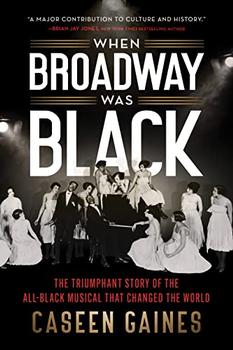Book Club Discussion Questions
In a book club? Subscribe to our Book Club Newsletter and get our best book club books of 2025!
For supplemental discussion material see our Beyond the Book article, Eubie Blake and Noble Sissle and our BookBrowse Review of When Broadway Was Black.
Please be aware that this discussion guide will contain spoilers!
- In the opening of the book, Sissle, Miller, and Lyles brace for the worst during Shuffle Along's most sincere love song. Why were they so afraid of the fallout from that particular scene?
- In describing Miller's childhood, Gaines draws attention to the
relationship between economic class and racism. How would
you describe that relationship? What are some ways in which
race and class intersect throughout the narrative?
- Diverse racial representation has a marked impact on audiences,
but what effect does it have on future productions? How did
Shuffle Along build on the accomplishments of earlier all-Black
shows like A Trip to Coontown, In Dahomey, and Bandanna
Land?
- What did you think of Black performers including blackface
in their own productions? What advantages and disadvantages
did they court by perpetuating minstrelsy tropes and broader
Black stereotypes?
- Blake's parents disagreed about whether to talk about their pasts. Blake's mother would never even admit that she had
been enslaved, while his father thought discussing slavery was
crucial. Who did you agree with and why?
- When the James Reese Europe's Society Orchestra is served
dishwater instead of the meal they were promised, Blake
observes that "Jim Europe didn't get where he is with the white
folks by complainin'." How does this capture the tenuous
balance the performers were trying to strike between largescale success and respect?
- Describe Jim Europe's impact on Noble Sissle. How did
Europe's example guide Sissle in advancing his career and
highlighting the artistry of other Black performers?
- During their vaudeville days, Blake and Sissle had contrasting
views on their never-ending travel, a lifestyle that could be
dangerous for Black performers. Would you travel most of the
year if it meant you could follow your dream, or would you
rather have a consistent place to call home?
- Shuffle Along was celebrated for introducing Black women
to the stage but earned a reputation for rejecting or sidelining
chorus girls for being "too dark." Were the show's creators
wrong for casting based on skin color? How does colorism
compare to racism more generally?
- Miller and Lyles thought that it was unfair that Blake and
Sissle were making more money from the show and its music.
Did you think Miller and Lyles were entitled to any portion of
the royalties from Shuffle Along's sheet music?
- In their later ventures, Sissle and Blake were challenged by
(white) critics who thought their shows had "too much 'art'
and not enough Africa." How did they handle this criticism?
What would you have done in their position?
- In your opinion, what is Shuffle Along's most lasting impact?
Do you think it should be revived? How can we preserve the
contributions it made to the theatrical canon?
Unless otherwise stated, this discussion guide is reprinted with the permission of Sourcebooks.
Any page references refer to a USA edition of the book, usually the trade paperback version, and may vary in other editions.
